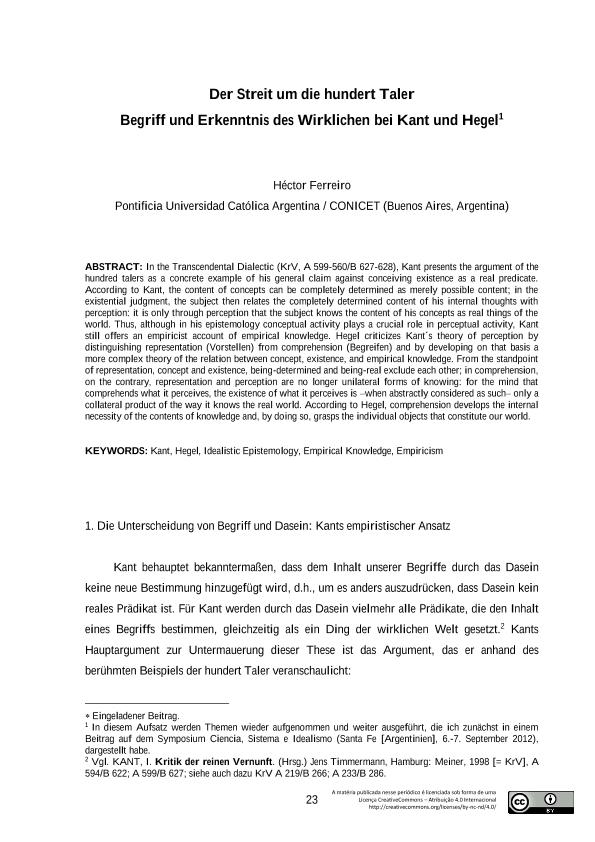Artículo
Der Streit um die hundert Taler: Begriff und Erkenntnis des Wirklichen bei Kant und Hegel
Fecha de publicación:
11/2016
Editorial:
Sociedade Hegel Brasileira
Revista:
Revista Eletrônica Estudos Hegelianos
ISSN:
1980-8372
Idioma:
Alemán
Tipo de recurso:
Artículo publicado
Clasificación temática:
Resumen
In the Critique of Pure Reason (KrV, A 599-560/B 627-628), Kant presents the argument of the hundred talers as a concrete example of his general claim against conceiving existence as a real predicate. According to Kant, the content of concepts can be completely determined as merely possible content; in the existential judgment, the subject then relates the completely determined content of his internal thoughts with perception: it is only through perception that the subject knows the content of his concepts as real things of the world. Thus, although in his epistemology conceptual activity plays a crucial role in perceptual activity, Kant still offers an empiricist account of empirical knowledge. Hegel criticizes Kant´s theory of perception by distinguishing representation (Vorstellen) from comprehension (Begreifen) and by developing on that basis a more complex theory of the relation between concept, existence, and empirical knowledge. From the standpoint of representation, concept and existence, being-determined and being-real exclude each other; in comprehension, on the contrary, representation and perception are no longer unilateral forms of knowing: for the mind that comprehends what it perceives, the existence of what it perceives is ?when abstractly considered as such? only a collateral product of the way it knows the real world. According to Hegel, comprehension develops the internal necessity of the contents of knowledge and, by doing so, grasps the individual objects that constitute our world.
Palabras clave:
Filosofía Clásica Alemana
,
Hegel
,
Kant
,
Teoría del Conocimiento
Archivos asociados
Licencia
Identificadores
Colecciones
Articulos(SEDE CENTRAL)
Articulos de SEDE CENTRAL
Articulos de SEDE CENTRAL
Citación
Ferreiro, Hector Alberto; Der Streit um die hundert Taler: Begriff und Erkenntnis des Wirklichen bei Kant und Hegel; Sociedade Hegel Brasileira; Revista Eletrônica Estudos Hegelianos; 13; 21; 11-2016; 23-38
Compartir




